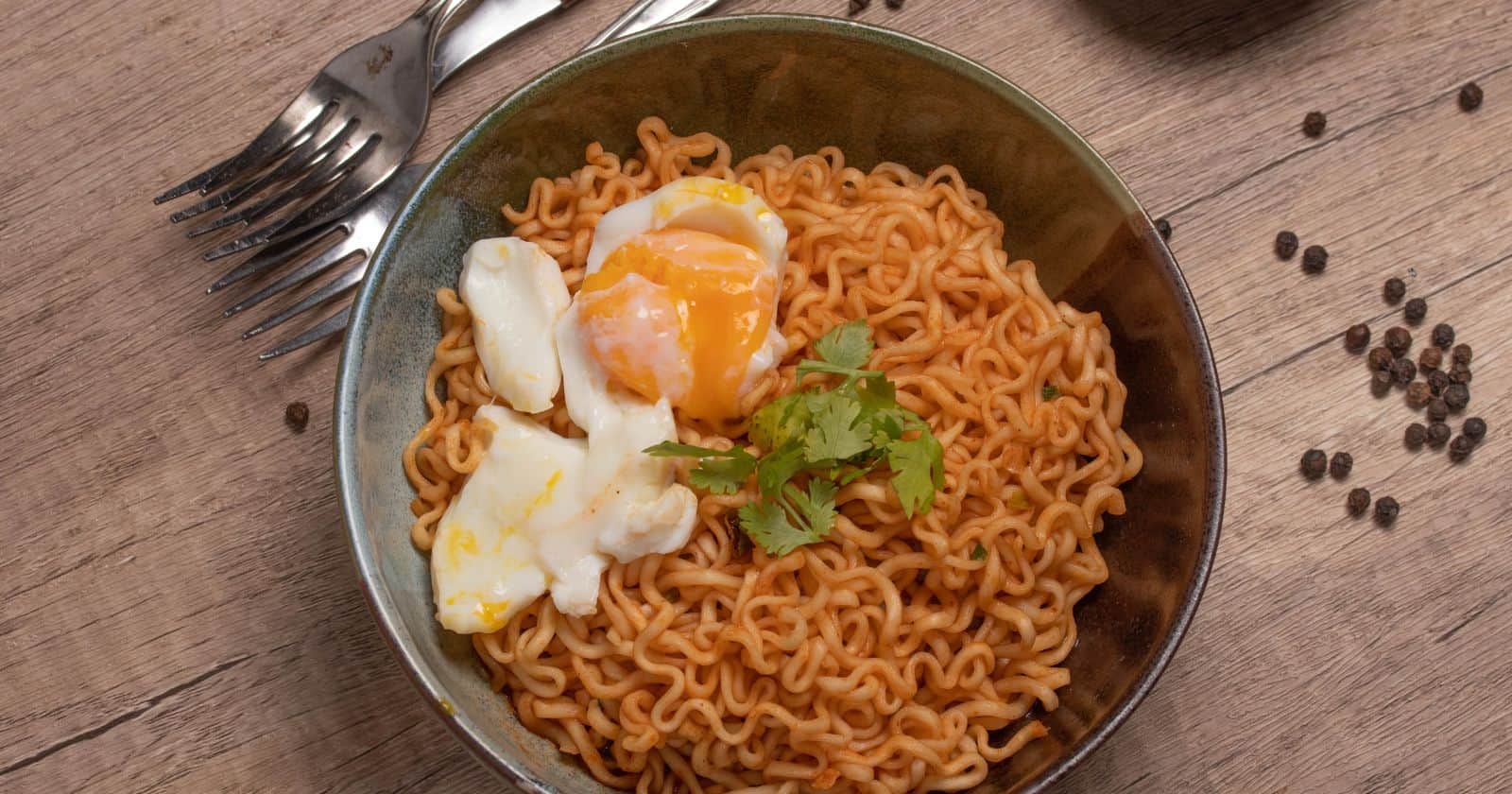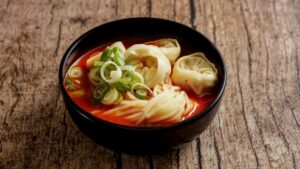Ramen noodles are an inexpensive convenience food that many people rely on daily for quick meals. But with sky-high sodium levels and little nutritional value, is scarfing down ramen twice a day actually detrimental for your health?
While occasional ramen is fine, making it a regular twice-daily habit can increase the risk of high blood pressure, weight gain, heart disease, and nutritional deficiencies over time due to:
- Dangerously high sodium content, with one pack containing over 50% of the daily recommended value
- Refined carbohydrates without much fiber, protein, or beneficial fats
- Lack of important vitamins and minerals that get depleted without sufficient nutrient-dense foods
- Fatigue and dehydration from excess salt intake
The good news? You can still enjoy ramen in moderation by customizing with nutritious add-ins and choosing lower sodium options. Curious if your ramen obsession is hurting your health? Read on to learn how much is too much and get tips to offset the risks.
Why Ramen is Popular
First, it’s helpful to understand why instant ramen has become such a dietary staple, especially for college students and busy professionals. Here are some of the main reasons people reach for ramen so often:
- Cost – At around 30 cents per packet, ramen is an affordable meal option even for very tight budgets.
- Convenience – Ramen cooks up in just 3 minutes with minimal prep involved. It’s ready faster than takeout or delivery.
- Customizable – With ingredients like eggs, vegetables, or proteins, ramen can be dressed up in endless ways.
- Shelf stable – Dried ramen noodles keep for months in the pantry, ready when you need them.
- Portable – The lightweight packets are perfect for taking camping or storing in your desk drawer for quick lunches.
- Tastes good – The sodium and fat create a savory umami flavor that hits the spot.
Downsides of Too Much Ramen
While the convenience of ramen is undeniable, regularly eating it multiple times a day can negatively impact your health. Here are some of the biggest risks to watch out for:
High Sodium
The biggest health concern with ramen is the very high sodium content. One package can contain over 1,700 mg – well over the recommended daily intake. Too much sodium has been linked to high blood pressure, heart disease, and stroke.
Lack of Nutrients
Ramen is essentially refined carbohydrates and salt. Two packs provide over half of your calories with very few vitamins, minerals, or fiber. This can lead to deficiencies over time.
MSG and Additives
The flavor packets contain MSG, TBHQ, and other potentially harmful additives that some researchers believe may negatively impact health when consumed regularly.
Fat Content
While not excessively high in fat, much of the fat in instant ramen noodles is saturated. Combined with the refined carbs, this may contribute to weight gain and associated health risks.
Not Filling
Due to the simple carbs and lack of protein or fiber, ramen does not actually fill you up. You may find yourself hungry again soon after eating it.
Health Consequences of Daily Ramen
Consuming ramen noodles one or two times per day on a regular basis can lead to both short and long term health consequences:
Dehydration
All that sodium will cause you to retain water and feel constantly thirsty. This can manifest in symptoms like headaches, fatigue, and muscle cramps.
High Blood Pressure
Over time, consistently elevated sodium levels from ramen can cause hypertension, putting strain on your heart and circulatory system.
Weight Gain
The refined carbs and fat without much protein or fiber can easily lead to putting on excess pounds. Obesity increases your risk for many chronic illnesses.
Heart Disease
Along with high blood pressure, the sodium, fat, and lack of nutrients in ramen ultimately increase your chances of developing cardiovascular disease.
Deficiencies
Important micronutrients like calcium, potassium, iron, and B vitamins may become depleted without enough fruits, veggies, lean proteins, and whole grains in your diet.
GI Issues
Some preservatives added to ramen may irritate the digestive tract, causing symptoms like bloating, cramping, or diarrhea when consumed regularly.
Healthy Ramen Habits
While scarfing down multiple packs of instant ramen every day isn’t ideal, you can enjoy it moderately as part of an overall balanced diet. Here are some tips:
- Limit yourself to 1-2 ramen meals per week at most to keep sodium in check.
- Always pair with other nutritious foods like lean protein, vegetables, or fruit.
- Opt for low-sodium options when possible to cut salt intake.
- Drink plenty of water to counteract the dehydrating effects.
- Take a multi-vitamin to fill any nutritional gaps.
- Read labels carefully and avoid artificial ingredients when you can.
- Slowly cut back on ramen frequency and replace with healthier options like brown rice or soba noodles.
Tips for Reducing Ramen’s Unhealthy Impact
If ramen is a staple in your diet, try these easy ways to minimize the unhealthy effects:
- Use only half the flavor packet to cut sodium intake.
- Load up with veggies like cabbage, mushrooms, carrots, greens, and bean sprouts.
- Stir in an egg for extra protein and nutrients.
- Opt for a reduced sodium broth like chicken or vegetable in place of water.
- Skip the seasoning entirely and flavor with garlic, chili oil, ponzu, or sesame oil instead.
- Choose whole grain noodles when possible for more fiber.
- Top with leftover chicken, shrimp, or tofu for a protein boost.
- Look for low-carb shirataki noodle options to reduce refined carbs.
Healthy and Delicious Alternatives to Ramen
While restraint is key for enjoying ramen responsibly, switching things up with nutritious noodle alternatives can give your body a much-needed break while still satisfying cravings. Try these ideas instead:
- Zucchini noodles with chicken and pesto
- Pad thai with shrimp and peanuts over rice noodles
- Chicken noodle soup with whole wheat pasta
- Beef and broccoli with udon noodles
- Spicy peanut chajang noodles with tofu
- Stir fry with soba noodles, veggies, and cashews
- Spring rolls on rice paper with hoisin dipping sauce
- Greek yogurt bowls with chickpeas, cucumbers, tomatoes over quinoa
With some easy meal preparation strategies focused on more veggies, lean proteins, and whole food sources of carbs, you can kick the ramen habit while still enjoying delicious and nutritious noodle dishes on a regular basis. Your body will thank you!
The Verdict on Ramen Every Day
At the end of the day, occasional ramen likely won’t cause harm. But making it a daily dietary habit can have negative consequences over time due to the high sodium, MSG, lack of nutrients, fat content, and refined carbs. Establishing healthy ramen habits focused on moderation, adding nutrition, and limiting artificial ingredients can help offset the risks. For even more benefits, gradually transition to similar but more nutritious noodle dishes as your go-to choices.





